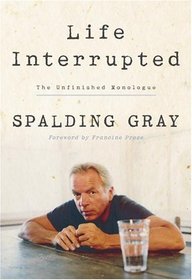Search -
Life Interrupted : The Unfinished Monologue
Life Interrupted The Unfinished Monologue
Author:
As the first decade of the new century was getting underway, Spalding Gray worried that the joy he’d finally found with his wife, stepdaughter, and two sons would fail to fuel his work as a theatrical monologist the way anxiety, conflict, doubt, and various crises once had. Before he got the chance to find out, however, an automobile accid... more »
Author:
As the first decade of the new century was getting underway, Spalding Gray worried that the joy he’d finally found with his wife, stepdaughter, and two sons would fail to fuel his work as a theatrical monologist the way anxiety, conflict, doubt, and various crises once had. Before he got the chance to find out, however, an automobile accid... more »
ISBN-13: 9781400048618
ISBN-10: 1400048613
Publication Date: 10/4/2005
Pages: 256
Rating: 1
ISBN-10: 1400048613
Publication Date: 10/4/2005
Pages: 256
Rating: 1
2.5 stars, based on 1 rating
Genres:
- Biographies & Memoirs >> Arts & Literature >> Actors & Entertainers
- Biographies & Memoirs >> Arts & Literature >> Theatre
- Biographies & Memoirs >> General
- Biographies & Memoirs >> Memoirs
- Nonfiction >> Automotive >> Traffic & Safety




